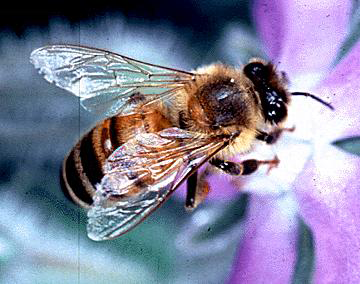
World Science is reporting about a surprising discovery made by researchers from Johannes Gutenberg University in Mainz, Germany who have determined that honeybees can not only be taught to recognize human faces, but can also remember them for several days. The study re-opens a human neuroscience question thought by many to be already definitively answered and may lead to advances in face-recognition software.
Prior to this research it was a widely held belief that both a large brain and specialized area of the brain were required for facial recognition. In the human brain, the fusiform gyrus, also known as the (discontinuous) occipitotemporal gyrus, area of the temporal lobe handles face recognition in addition to word and number recognition. With only one-ten thousandth of the brain cells of a human, the bees in this study are bringing new scrutiny to these two requirements.
During the study, which was led by Adrian G. Dyer, honeybees were shown photographs of human faces, some of which had a drop of sugar water next to them while others had a drop of a bitter liquid. In an effort to limit visual variables, the pictures, taken from a human psychology test, were of human faces only and were similar in color and size. Not all of the bees learned which faces led to the sugary treats, but the ones that did were able to recognize the correct face 80% of time, often hovering briefly in front of the photos while determining which one to choose. Additionally, two of the bees that showed aptitude on the first day were tested two days later and only had a slight decrease in their accuracy. Interestingly, the scientists claim that the bees that did not choose correctly did so not because they lacked the ability for recognition, but rather because they did understand the importance of the photos at all.
The honeybee was an obvious choice to be the subject of this experiment. Scientists have long known about their ability to distinguish different types of flowers, and even recognize members of their own hive.
Additional work will now need to be done to try to understand how the recognition process in bees actually works. Even in humans the process varies by age. Children pick out distinct features while adults look at the bigger picture (pardon the pun), learning the relationship between all of the features instead of focusing on one or two individually. Regardless of how they do it, the bees have illustrated that a large, complex brain is not necessary, and although there is not a lot of insight into the mechanism, it at least offers hope that better facial recognition algorithms and software are possible.
The study will appear in the December 15th issue of the Journal of Experimental Biology.
Read the full article at World-Science.net: “Bees can recognize human faces, study finds”
